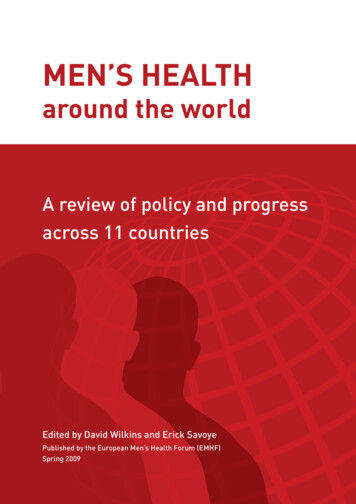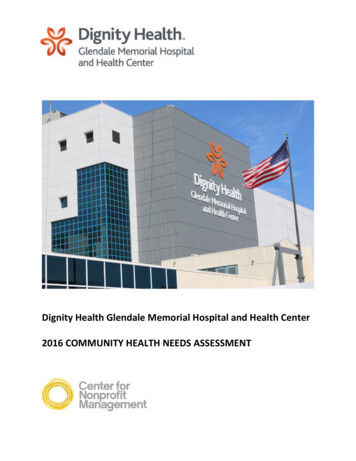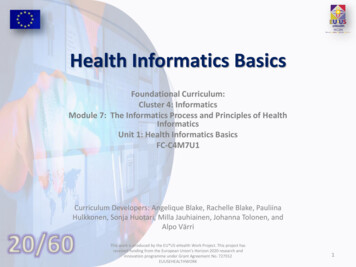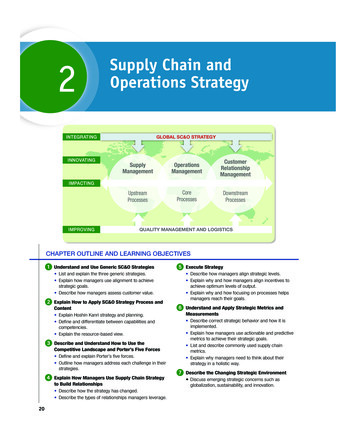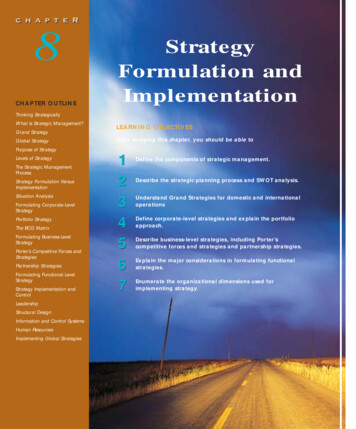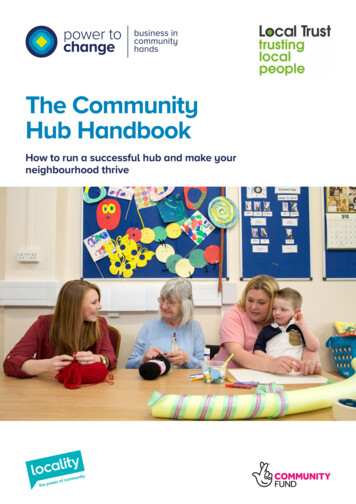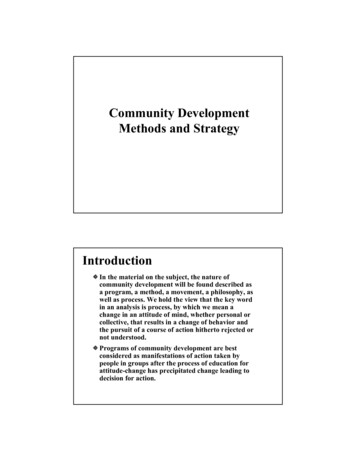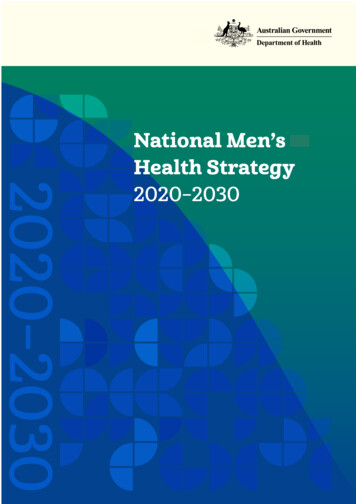
Transcription
Fiscal Year2017-2019Community Health StrategyAddressing Community Health NeedsMercy Hospital
Table of ContentsIntroduction. 3About EMHS. 3About Mercy Hospital. 3Addressing Community Health Needs.Shared Community Health Needs Assessment.Community Health Strategy.Feedback Opportunity.Evaluation Efforts.Approval from Governing Board.444455Selected Priorities of Focus.Priority #1: Substance Abuse Treatment.Priority #2: Affordable Housing and Homelessness.Priority #3: Medical Neighborhood.Priority #4: Preventive Screenings and Immunizations.Priority #5: Enrollment Activities and Coverage Counseling.Priority #6: Health Education.557891011Health Priorities Not Addressed. 12Conclusion. 12Appendix (Evaluation of Impact). 13Mercy Hospital, 175 Fore River Parkway, Portland, Maine 041022
IntroductionEMHS and our more than 11,000 employees care deeply about our neighbors and communities. EMHS memberorganizations work hard to understand and address priority needs. We meet regularly with community partnersto plan and implement local solutions that make it possible for people in our communities to lead healthier lives.By working together, we promote a culture of stewardship and foster vibrant communities.Mercy Hospital is committed to shaping health improvement efforts in its service area based on sound data,personal and professional experience, and community need. Through collaborative efforts, Mercy Hospitalcreates healthier communities through the provision of services, resources, and programs within and beyond thewalls of the hospital.About EMHSEMHS is an integrated health delivery system serving the state ofMaine. EMHS offers a broad range of health delivery services andproviders, including: acute care, medical-surgical hospitals, a freestanding acute psychiatric hospital, primary care and specialtyphysician practices, long-term care and home health agencies, ground and air emergency transportservices, community and population health.About Mercy HospitalMercy Hospital is a community hospital comprised of two acuteinpatient locations, six primary care practices, five Express Carefacilities, and 14 specialty practices. Mercy’s service area is thegreater Portland metropolitan area, roughly comprised of Maine’sCumberland County. The Portland area is experiencing an increasein diversity, with at least six percent of area residents born outside of the United States. Many of thesenew Mainers are refugees and asylum-seekers, who bring a unique set of circumstances and health needsto the community. Approximately 11 percent of Cumberland county households fall below the federalpoverty level.Mercy is a Roman Catholic hospital founded by the Sisters of Mercy. Its mission is to carry out “thehealing work of Christ by providing clinically excellent, compassionate health care for all, with specialconcern for the poor and disadvantaged.” It has fulfilled that mission for nearly 100 years, both in thehospital and in the community.3
Addressing Community Health NeedsShared Community Health Needs AssessmentIn 2016, Maine’s four largest healthcare systems – EMHS, Central MaineHealth Care, MaineGeneral Health, and MaineHealth – as well as theMaine Center for Disease Control and Prevention, an office of the MaineDepartment of Health and Human Services (DHHS) partnered to researchand publish a shared Community Health Needs Assessment (Shared CHNA).The Shared CHNA provides a comprehensive review of health data andcommunity stakeholder input on a broad set of health issues in Maine. TheShared CHNA data were made widely available to the public, as communityengagement forums were held across the state, gathering additional feedbackon priority issues and opportunities for community health improvement.These reports and the community input received are fundamental toachieving our goal of partnering with community, public health entitiesand accountable care networks to improve the health and well-being of thecommunities we serve.Results of the 2016 Shared CHNA along with community input were used to inform the developmentof this three-year Community Health Strategy by Mercy Hospital. The efforts identified within helpdemonstrate our commitment to our community, as we provide benefits reflective of our mission andtax-exempt status. These benefits include a focus on the clinical, social, and environmental factors thatinfluence the ability of people to lead healthier lives.Community Health StrategyThis Community Health Strategy was developed with input from communitystakeholders including those who serve priority populations, local PublicHealth District Liaisons, local business leaders, and community advocates.Priorities were selected after weighing the severity of each priority area,availability of known and effective interventions, determination that thepriority area was un-addressed or under-addressed, and communitycollaborations underway with Mercy Hospital.Mercy Hospital reserves the right to amend this Community Health Strategyas circumstances warrant. For example, certain community health needsmay become more pronounced and require enhancements or a refocus to theselected priorities of focus.Feedback OpportunityContact communitybenefits@emhs.org with feedback on this report.4
Addressing Community Health NeedsEvaluation EffortsThe priorities identified in the next section will guide the development of a community healthimprovement plan. This annual plan defines the operational approach to be taken to address the goalsand strategies articulated within. By using SMART Objectives (Specific, Measurable, Achievable,Realistic, and Time-Bound) to guide the intervention approach deployed, Mercy Hospital will be able tomonitor and evaluate progress over time.Approval from Governing BoardMercy Hospital’s Communith Health Strategy was reviewed by the hospital’s governing board and aresolution was made to approve and adopt both the Shared CHNA and the Implementation Strategy onApril 21, 2016.Selected Priorities of FocusPriority #1:Substance Abuse TreatmentRationale:The goal is to create a successful integrated and comprehensive substance abuse treatment model for theGreater Portland community.Intended action to address the need:In June 2015, Mercy Hospital moved Partial Hospitalization and Intensive Outpatient Services to the StateStreet Campus and closed the Recovery Center in Westbrook. Melissa Skahan, Vice President of MissionIntegration at Mercy Hospital, convened the Greater Portland Addiction Collaborative (GPAC) steeringcommittee to build capacity for addiction treatment in Greater Portland. GPAC focuses on four keygoals: the effective use of existing resources, lowering cost while increasing the availability of high qualitytreatment, filling the gaps by expanding the continuum, and ensuring accountability for services delivered.At a series of three meetings from December 2015 through February 2016, GPAC outlined Portland’sunmet need for addiction services for uninsured or under-insured persons; developed a comprehensive,low-cost model to meet that need; and determined the cost, funding strategy, accountability, andgovernance required for success.continued on next page5
Selected Priorities of FocusPriority #1:Substance Abuse Treatment continuedPrograms and resource allocation:Mercy Hospital has agreed to serve as the backbone organization to ensure integration and optimizationof the collaborative model. GPAC participants agreed upon a collaborative model for addiction services.Highlights of each partner’s role are as follows: Portland Police Department: PPD hired a Substance Abuse liaison to refer residents in need ofservice to the addiction collaborative and provide those residents ongoing support, saving on high-costincarceration. This clinician responds with police officers to all overdoses and works closely with streetoutreach and all providers. The Opportunity Alliance: This team of professional mobile outreach clinicians responds aroundthe-clock to crises and refer clients to the collaborative, working with hospitals, EMS, and police,promoting greater engagement in treatment and services. Milestone Foundation: The Milestone Foundation offers emergency shelter, medically manageddetoxification and long-term treatment. Their detoxification center will add bed capacity and additionalnursing staff in an effort to serve more uninsured persons. The Homeless Mobile Outreach Teamprovides critical street outreach and transport for much of the target population. Portland Recovery Community Center (PRCC): PRCC offers healthy community and peer supportto individuals seeking varied recovery pathways. Sustained peer support for all participants beginningat detox, including individual and group recovery support and coaching, at Milestone and in structuredsober housing, will be offered. Amistad: Peer Coaching Initiative provides daily intentional peer support and provides the oversight inthe GPAC structured sober housing. Community Housing of Maine (CHOM): is the largest provider of supportive housing in Maine. Theywill develop four properties for structured sober living for a total of 48 beds in year one, to reducelength of stay in detoxification without requiring housing assistance. Preble Street Services: Outreach and case management staff from Preble Street serve homelessindividuals in and out of shelter: veterans, trafficking victims, youth, and tenant/families in a number ofsites in Greater Portland. Catholic Charities: provides intensive outpatient, medication assisted treatment, and ongoingcounseling in a lower cost community-based setting. Catholic Charities will add clinical staff andadditional slots into intensive outpatient to serve more uninsured. Integrated Addiction Services of Mercy Hospital, Maine Health and Greater Portland Health: Allproviders will integrate addiction services into their primary care program to expand services andmedication assisted treatment.continued on next page6
Selected Priorities of FocusPriority #1:Substance Abuse Treatment continuedPlanned collaborations:Drawing on Portland’s strength as a small city where people know and trust one another, the collaborativealigns the efforts of the following organizations currently addressing the opioid crisis: Mercy Hospital,Milestone Foundation, Portland Community Health Center, Catholic Charities of Maine, PortlandRecovery Community Center, The Opportunity Alliance, Portland Police Department, The City ofPortland, Maine Medical Center, Amistad, Preble Street, and Community Housing of Maine.Population of focus:Treatment model for the Greater Portland communityPriority #2:Affordable Housing and HomelessnessRationale:McAuley Residence serves homeless women, who are battling substance use disorder with or without theirchildren. The majority of women are addicted to opiates with ten or more years of active use and significanttrauma, including rape, sex trafficking, and domestic violence. The program provides housing, access tocomprehensive care, and promotes healthy lifestyles and self-sufficiency.Intended action to address the need:McAuley Residence, a department of Mercy Hospital, is a comprehensive two-year program withtransitional housing for women in early recovery with or without children. In the newly-renovated space,McAuley Residence has fifteen apartments with beautiful common space for the residents to gather suchas a community kitchen and large playroom for the children. Each woman sets measurable goals aroundsobriety, parenting, education, employment, and financial stability and is held deeply accountable for theirpersonal success.Programs and resource allocation:Mercy Hospital provides the staffing (LMSW, LADC, and Peer) at McAuley Residence and providesresources to operate the program annually. Women and their children also have access to the resources ofMercy Primary Care and Specialty Care; and New England Eating Disorders Program as needed.Planned collaborations:McAuley Residence partners with several area primary care and mental health providers, hosts Alcoholicsand Narcotics Anonymous meetings, and welcomes community volunteers as both sponsors and mentors.The Opportunity Alliance provides parenting coaches for families; and local colleges, universities, andPortland Adult Education services provide educational opportunities and counseling services. Key Bankprovides individualized financial mentoring for the women to ensure financial literacy and self-sufficiency.Community Housing of Maine (CHOM) owns the property and provides apartments, office space,community kitchen and playroom space.continued on next page7
Selected Priorities of FocusPriority #2:Affordable Housing and Homelessness continuedCommunity Housing of Maine (CHOM, our housing partner) is a non-profit charitable organization thatas its core mission provides advocacy, supportive housing, community inclusion, and stability for homelessand special needs populations across the state. Catherine Morrill provides reduced child care servicesfor the children at McAuley Residence. Weekly seminars around women’s health issues, yoga, art lessons,and nutrition provide another venue for local artists, professionals, and chefs to volunteer at McAuleyResidence.Population of focus:The program serves women who have experienced addiction, homelessness, trauma, sex trafficking, anddomestic violence.Priority #3:Medical Neighborhood: Affordable options for people whoare uninsured or under-insuredRationale:The intent of this model is to provide access to care, leverage sustainable community assets, and promoterational utilization of all services.Intended action to address the need:Mercy’s Medical Neighborhood seeks to provide access to quality healthcare for all uninsured patients inthe Greater Portland community through the expansion of our flexible care delivery system. The intentof this model is to promote healthy relationships and rational utilization of services. The model seeks toreduce out of pocket costs associated with insurance plans, develop concrete supports, and reduce theoverall cost associated with care of uninsured and underinsured patients.Programs and resource allocation:Mercy’s Vice President of Mission facilitates the work of the medical neighborhood. The weekly meetingsof the neighborhood team discuss the needs of individual high users, system issues, and trends acrossthe care delivery system. Mercy’s Emergency Department Care Manager and Financial Counselors play acritical role in developing a rapport with uninsured patients in the acute setting and engaging the necessaryneighborhood resources such as peers, street outreach, or CHOWs to begin the desired transition to amedical home. Financial Counselors routinely meet patients in community to complete a comprehensivescreen for resources.The Utilization Review Team reviews all requests for care for uninsured persons to determine if the requestmeets medical necessity and to ensure that care is coordinated with community resources and providers.continued on next page8
Selected Priorities of FocusPriority #3:Medical Neighborhood: Affordable options for people whoare uninsured or under-insured continuedIn 2015, utilization review process resulted in cost avoidance of 1.3M in unnecessary or duplicative care.The medical neighborhood team advanced 444 individuals for disability, which provides access to a widearray of services, housing, and resources.Planned collaborations:Experts from Amistad’s Peer Support Program, Milestone’s Homeless Outreach & Mobile Engagement(HOME) Team, outreach workers from the City of Portland, Preble Street, and the Oxford Street Shelter;and Community Health Outreach Workers (CHOWs) from Portland’s Health Equity Department respondto the unique needs of the vulnerable patients in Mercy’s Medical Neighborhood and provide the necessaryconsumer insight to actively guide the response of the healthcare delivery system. The Patient CenteredMedical homes at Portland Community Health Center (PCHC) and Mercy’s Portland Internal Medicine(PIM) have integrated social interventions into their care delivery models with behavioral health services,community care teams, and care management; and remain committed to continually improving the patientexperience for uninsured populations. Mercy’s Financial Counselors offer marketplace enrollment servicesand advocate for governmental resources such as Medicaid Disability and Social Security benefits forall neighborhood patients. Patients access Mercy’s medical neighborhood services through any partneragency, building upon existing relationships.Population of focus:All uninsured patients in the Greater Portland community.Priority #4:Preventive Screenings and ImmunizationsRationale:Preventive screenings and immunizations help identify hidden disease risks for improved health andprovide protection against infection with viruses.Intended action to address the need: Mercy Hospital participates in health education events in Greater Portland and other health fairs withinparishes, non-profits such as Amistad, and faith communities. All of Mercy’s Primary Care Centers have achieved Patient Centered Medical Home certification andmeasure progress for all patients regarding engagement in preventive screenings, preventive care, andimmunizations.continued on next page9
Selected Priorities of FocusPriority #4:Preventive Screenings and Immunizations continuedPrograms and resource allocation:Mercy Hospital provide administrative staff and clinical staff for flu clinics, outreach events, and healthfairs. Mercy Hospital provides trans disciplinary staff in primary care sites to deliver integrated behavioralhealth services and social interventions to ensure comprehensive care and improved quality of life.Planned collaborations:Mercy Hospital partners with the Cumberland County District Public Health Council, local publichealth departments, city leaders, schools districts, parishes, and public housing to provide flu clinics andparticipate in health fairs. Mercy’s Primary Care sites partners with local behavioral health providersand Community Care Teams. Through the work of the CDPHC, collaboration occurs to ensure accessthroughout the county to needed immunization clinics.Population of focus:All patientsPriority #5:Enrollment Activities and Coverage CounselingRationale:Raise awareness of affordable coverage options and promote its enrollment and financial counselingservices to the community at large.Intended action to address the need:Mercy Hospital welcomes all uninsured persons to provide education o
the GPAC structured sober housing. Community Housing of Maine (CHOM): is the largest provider of supportive housing in Maine. They will develop four properties for structured sober living for a total of 48 beds in year one, to reduce length of stay in detoxification without requiring housing assistance.
